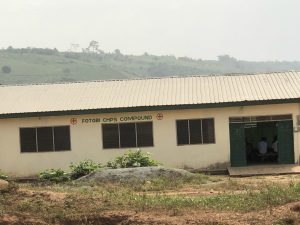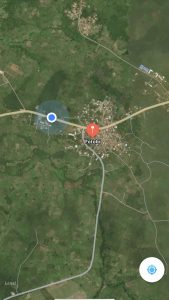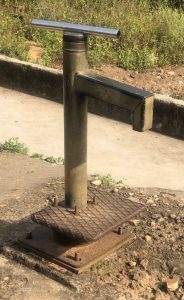This project is made possible through the partnership of WATER CHARITY and the NATIONAL PEACE CORPS ASSOCIATION.![]()
 Location
Location
Fotobi, Aburi – Akuapim, Eastern Region, Ghana
Community Description
Fotobi is a small village located below the mountainous region of Aburi – Akuapim in the eastern part of the country, between Obodan and Doboro along the stretch of Aburi – Nsawam dirt road.
There are 116 people living in the village who are mostly peasant farmers and petty traders. This community among others is known for their experience in pineapple production. Other crops produced by them are corn, cassava, plantain, cocoyam, yaw, banana, sugar cane, citrus and many others. Families living close to the roadside are often seen selling some of their farm produce to drivers and passengers traveling along that stretch.
There are numerous tribes living in this community which is comprised of the Akuapim’s, the Ewe’s, the Fanti’s, the Gas , the Hausas, and the Lartes.
 The people of the village celebrate a festival called Odwira, an annual festival celebrated in the month of September to remember the victory over the Ashanti’s in 1826. Odwira is a weeklong series of tradition and rituals performed to purify the town, the people and most importantly, the ancestral stool of the chiefs. It’s also a festival to celebrate the harvest of yam.
The people of the village celebrate a festival called Odwira, an annual festival celebrated in the month of September to remember the victory over the Ashanti’s in 1826. Odwira is a weeklong series of tradition and rituals performed to purify the town, the people and most importantly, the ancestral stool of the chiefs. It’s also a festival to celebrate the harvest of yam.
Some of the dishes enjoyed by the people are fufu, banku, ampesi, omo tuo, konkonte, erto, tuozafi and many others.
There is electricity in the village, but as a result of low level of income many people are seen living without it. Few other social amenities that can be seen from the village are Chip compound (clinic) and basic school.
The people of Fotobi are believers of Christianity, Islam and Traditionalist. They all respect each other’s choice of worship and lives with peace and love.
Problem Addressed
In 2005, the people of Fotobi were provided a borehole with a handpump. A few years later they noticed color change on the surface of the water when fetched. This turned out to be as a result of an excess amount of iron present in the ground water. As a result of this, the only water source in the has not been operational for the past 22 months.
Children and women now have to walk for about 30 to 45 minutes to access clean water.
 Project Description
Project Description
This project is to convert the handpump on the borehole with an electric-powered system, install a 3,000L water tank and tower, and install treatment / filtering chamber.
The hand control component of the old system, including the manual metal pump, will be dismantled, and replaced with an immersed 2HP electric motor pump.
The ground water at a depth of 60 meters will then be transported into the tank through three (3) cylindrical Bombola treatment/filtering chambers. Second and third cylindrical Bombola will contain a mixture of carbon, sand and resin as the other one contains activated charcoal. All the three bombolas will be connected to each other and then to the water tank by new piping.
Other work includes the construction of a concrete platform to hold tank and the building of a soak-away pit to collect overflow.
Water Charity funds will be used for materials and skilled labor. Africa H2O will manage the project and organize the unskilled labor.
Project Impact
116 people living in the community will benefit from the project.
Project Administration
This project will be implemented under the direction of Nana Kudjoe Kesse, Executive Director and Chief Operations Officer of H2O Africa Care. This is another in a series of successful projects he has directed.
We are grateful to Solomon Amuzu, of Call to Nature Permaculture, who is providing additional assistance and oversight.
Monitoring and Maintenance
Once the project is completed it will be handed over to the village authority, which will take full control. A team from the village will be appointed to run the facility.
Small dues will be collected monthly to maintain the facility, and repair it when needed. The H2O Africa team will visit the facility occasionally to ensure it is being properly cared for.
Project Funding
The funding for this project has been provided by an anonymous donor.
If you like this project, please make a general-purpose donation to Water Charity, so that we will have funds available to immediately start our next project in Ghana.